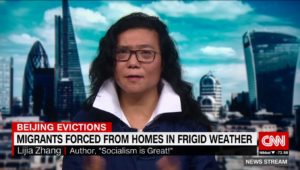
Very slowly the dreadful verdict of China’s approximately 30 million left-behind children on the country-side is slowly getting more coverage. Journalist Zhang Lijia, preparing a book on the issue, summarizes the problems for the New York Times. Why have they been forgotten?
Zhang Lijia:
And while urban children have thrived academically in recent decades, that has not been the case for their rural cousins, especially those who have been left behind. A study by Stanford University researchers, in collaboration with Chinese academics, found that children in the countryside were much less likely to complete high school. Those with both parents having left for the city perform markedly worse in school than those having one parent around, and boys are affected more than girls.
Other factors contribute to low academic achievement in rural China — notably, poor teaching standards and facilities at rural schools, and prohibitively high tuition costs (only nine years of school is free). But the crucial factor is the absence of parents.
Even children from the countryside who move to the cities with their parents are unlikely to get a good education. In recent years, restrictions on migrants to the cities have been easing. But in most cities, migrant parents still have great difficulty sending their children to good local schools because they need documents such as a resident permit, job and rental contracts, proof that taxes have been paid and so on.
Several sensational stories in recent years have brought attention to the problem of left-behind children. Among them, in June 2015, four left-behind siblings committed suicide together by swallowing pesticide in Guizhou Province.
In response, in 2016 the government called for better social services to protect such children. But on my recent visits to the countryside, in interviews with children and parents, it’s clear that a great deal more needs to be done. Rural education and village-level social services still lag. And migrants must be allowed to send their children to good local schools in urban areas where they work — and not substandard, makeshift schools for migrant kids.
Without effectively addressing the problems facing left-behind children and providing for the needs of rural youths, the vaunted “Chinese Dream” will remain unfulfilled for much of the country.
Zhang Lijia is a speaker at the China Speakers Bureau. Do you need her at your meeting or conference? Do get in touch or fill in our speakers’ request form.
Are you looking for more political experts at the China Speakers Bureau? Do check out this list.
